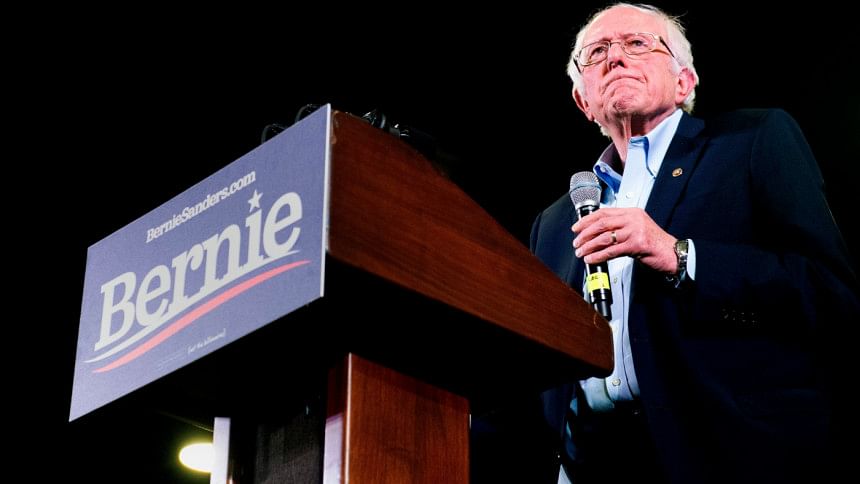The Sanders campaign: A requiem

"Politics is the art of the possible."
— Otto von Bismarck, German chancellor
After a spirited, valiant battle for the Democratic nomination for US presidential elections in November, Bernie Sanders, a US senator from Vermont, called it a day.
Cheer up, Bernie supporters!
Former US Vice President Joe Biden may be the putative Democratic candidate, but Sanders did himself proud. The proud, octogenarian curmudgeon's rants against "the billionaires and millionaires" in his trademark thick Brooklyn accent will continue to reverberate in the 2020 campaign.
The Biden campaign is scrambling to woo him. Come November, the US presidential election might go down to the wire. Democrats realiSe they need every possible vote. Bernie supporters are a critical chunk they can ill afford to lose.
Though my favourite candidate was Elizabeth Warren, a US senator from Massachusetts, I deeply admire and love Bernie and his supporters. I also have to say, with regret, that their campaign was seriously hamstrung, a crucial point to which I shall return.
But first of all, let's give credit where credit is due. Bernie Sanders put back the soul into the Democratic Party. Gentrified and technocrat-driven in the recent past, the party sometimes seems driven by policies that do not take the measure of how horribly the bottom half of Americans have been shortchanged in the past few decades. Wealth distribution is obscenely lopsided, benefiting a tiny percentage at the very top of the American socio-economic pyramid.
The economic gap is driven by class and demographics of race and age. No wonder the Sanders campaign managed to really fire up the young. Saddled with huge college loans, facing dismal job prospects and scary health care costs, young people have an acute sensitivity to the inequities of US society.
His overarching indictment of the gross inequity of US society struck a chord with a substantial part of the Democratic electorate. It was backed by specific radical policy prescriptions.
Bernie supporters, stand tall and be proud. His name won't appear on the November ballot, but expect Biden to incorporate a number of your policy planks, or come really close. And that's not just to woo you (although there's a bit of that, too), it's also because Sanders' presidential campaigns in 2016 and this year have changed Democratic politics. A publicly-run health system dubbed Medicare-for-all used to be a non-starter; many of this year's candidates backed it. Ditto for student loan debt forgiveness.
Former US President Barack Obama once said there are two kinds of politics—transactional and transformational.
Several decades down, Biden or former presidential candidate Hillary Clinton may well become historical footnotes; Sanders, on the other hand, could be remembered for his transformational politics.
Now, Bernie supporters, some tough love on how to make that happen.
First, you have to recognise where you screwed up.
Democratic politics is a messy, imperfect business. Integrity, principled commitment to the common good is wondrous. But it's not enough. At the end of the day, you have to convince enough people that your policies are right and you can win. And to do that, you need to be flexible, engage in give and take, cut policy deals here and there.
You can be pure as the driven snow, and become a political martyr. Or you can expand your coalition. My own interactions with the odd expat Bangladeshi who had "felt the Bern" left me sceptical. Passionate and utterly sure of themselves, they were not inclined to brook any compromise at all.
In fact, the Bernie campaign tacitly conceded they could not win a majority. They based their strategy on a plan that expected the non-Bernie primary vote do be divided and their candidate romping hope with 30 percent of the vote.
It did not quite pan out that way.
After the first primaries in Iowa, New Hampshire and Nevada, Bernie supporters were delighted with his performance. Then South Carolina happened. African American voters, a decisive factor in the state, voted overwhelmingly for Biden.
The African American community gets to decide who gets to be the Democratic nominee and I deeply respect that. This proved to be the undoing of Sanders. After an overwhelming win in South Carolina, Biden didn't look back.
No, Bernie supporters, it was not because the fat cats of the Democratic Party all ganged up against you, because they didn't. They were still sitting on the fence.
After the primaries in Iowa, New Hampshire and Nevada, the Biden campaign was in its death throes. It had no money and virtually non-existent infrastructure in the vast majority of states. He still won convincingly, sometimes overwhelmingly.
Why did African Americans support Biden? I would speculate two reasons. One is Biden's unflinching, devoted support of Obama during his presidency. Their second reason, I suspect, is what drew all other non-Bernie players to coalesce against Sanders as well.
I forget which astute analyst made the observation, but he was right on the money—what Biden had going for him was the greatest ever get-out-the-vote incentive for Democrats in recent history, Donald Trump, our current president.
Trump is the king of dirty politics, and he is flush with campaign cash. My feeling is that many primary voters ultimately chose Biden although they liked and admired Bernie. They figured many of "democratic socialist" Bernie's policy positions—Medicare for all, moratorium on deportations and decriminalising illegal border crossings—would make him easy prey for the Trump campaign.
Biden, though not particularly exciting, seems a much safer bet. For a vast majority of Democrats, defeat of Trump, well, trumps, all other policy considerations.
We will have to wait until November to see if they made the right call.
Ashfaque Swapan is a contributing editor for Siliconeer, a digital daily for South Asians in the United States.

 For all latest news, follow The Daily Star's Google News channel.
For all latest news, follow The Daily Star's Google News channel. 



Comments